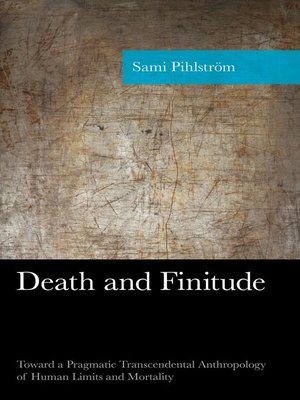Death and Finitude
ebook ∣ Toward a Pragmatic Transcendental Anthropology of Human Limits and Mortality · American Philosophy Series
By Sami Pihlström

Sign up to save your library
With an OverDrive account, you can save your favorite libraries for at-a-glance information about availability. Find out more about OverDrive accounts.
Find this title in Libby, the library reading app by OverDrive.



Search for a digital library with this title
Title found at these libraries:
| Library Name | Distance |
|---|---|
| Loading... |
Death and Finitude offers an examination and defense of a pragmatic transcendental anthropology applicable to the concepts of limit, finitude, and mortality that are constitutive of human life as we know it. Sami Pihlström develops a special kind of philosophical anthropology —a pragmatic yet transcendental examination of the human condition—that interprets what is worth preserving in the tradition of transcendental philosophy in such a manner that this unusual combination will crucially enrich our understanding of a human problem we all share: mortality.
In some sense, all serious philosophy inevitably reflects on the human condition and is thus philosophical anthropology, broadly conceived. There can hardly be any more serious problem concerning the human condition than the problem of death. Yet, mainstream analytic contributions to the philosophy of death usually addresses death in general, and it is far from obvious that such contributions are philosophically relevant in the sense of addressing the agony of an individual human being trying to understand their own mortal condition. "Continental" philosophy of death may be frustrating in a different sense, as it often fails to be conceptually as clear and argumentatively as rigorous as the analytic literature. Claiming to address my "being-toward-death", such contributions may also fail to speak to the mortal individual if they end up in endless pseudo-philosophical jargon. It is against this background of frustration that Death and Finitude contributes to humanity's on-going reflections on death, dying, and mortality—from a pragmatist yet transcendental perspective, seeking to accommodate these topics within a broader philosophical anthropology.
The book is primarily intended for academic philosophers, but the potential readership includes not only scholars but also both graduate students and advanced undergraduates, as well as general educated readers. It is relevant to the concerns of philosophers specializing in transcendental philosophy, philosophical anthropology, pragmatism, Wittgenstein, and the philosophy of religion. As the book may be said to be an attempt to "philosophize historically," it is in principle of interest to both systematically and historically oriented philosophers and students.
In some sense, all serious philosophy inevitably reflects on the human condition and is thus philosophical anthropology, broadly conceived. There can hardly be any more serious problem concerning the human condition than the problem of death. Yet, mainstream analytic contributions to the philosophy of death usually addresses death in general, and it is far from obvious that such contributions are philosophically relevant in the sense of addressing the agony of an individual human being trying to understand their own mortal condition. "Continental" philosophy of death may be frustrating in a different sense, as it often fails to be conceptually as clear and argumentatively as rigorous as the analytic literature. Claiming to address my "being-toward-death", such contributions may also fail to speak to the mortal individual if they end up in endless pseudo-philosophical jargon. It is against this background of frustration that Death and Finitude contributes to humanity's on-going reflections on death, dying, and mortality—from a pragmatist yet transcendental perspective, seeking to accommodate these topics within a broader philosophical anthropology.
The book is primarily intended for academic philosophers, but the potential readership includes not only scholars but also both graduate students and advanced undergraduates, as well as general educated readers. It is relevant to the concerns of philosophers specializing in transcendental philosophy, philosophical anthropology, pragmatism, Wittgenstein, and the philosophy of religion. As the book may be said to be an attempt to "philosophize historically," it is in principle of interest to both systematically and historically oriented philosophers and students.







